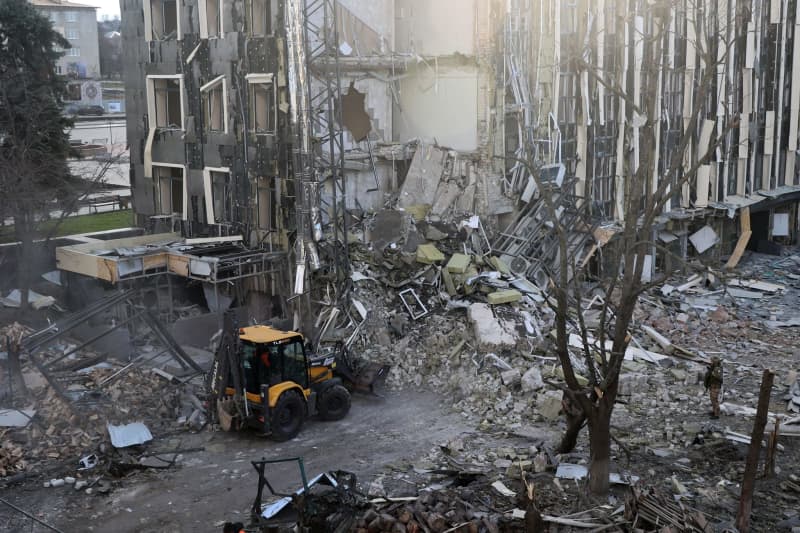Escalating Drone Warfare and Regional Tensions
Russia launched another extensive wave of drone strikes on Ukraine overnight, according to Ukrainian air defense reports on Saturday. Ukrainian forces intercepted 67 of the 139 drones deployed, while 71 others reportedly vanished from radar—likely downed by electronic countermeasures. The attacks sparked fires in residential areas of the Sumy region, though no casualties were immediately reported. Simultaneously, Russian authorities claimed to have intercepted 36 Ukrainian drones over four regions, including Volgograd and Krasnodar. Debris from the strikes damaged homes, vehicles, and a power line in Belgorod, leaving several villages without electricity. This exchange highlights the intensifying cross-border conflict, now nearing its third year, with Ukraine increasingly reliant on Western military aid to withstand Russia’s onslaught.
Zelensky Warns of Russian Mobilization and Prolonged War
Ukrainian President Volodymyr Zelensky issued stark warnings about Russia’s expanding military ambitions, asserting that Moscow is bolstering its forces and weapons production to prolong its invasion. In a social media post, Zelensky accused Russia of forming new military divisions, collaborating with North Korea to acquire arms, and spreading advanced drone technology—a move he claims destabilizes global security. "Putin is preparing not for peace, but to continue this war—and not just against Ukraine," Zelensky declared. He urged European nations to urgently strengthen their defenses, alleging that Russia aims to recruit over 100,000 additional soldiers. While details of the troop build-up remain unverified, Zelensky reiterated Ukraine’s readiness to share intelligence with allies.
North Korean Troops Rejoin Russian Offensive, Says Zelensky
In a contentious claim, Zelensky stated that North Korean soldiers have resumed frontline operations alongside Russian troops in Kursk after a brief withdrawal. He reported "hundreds" of Russian and North Korean casualties, though these figures remain unconfirmed. Reports suggest Pyongyang dispatched up to 12,000 troops to support Moscow, though Western analysts speculate heavy losses forced their temporary retreat. North Korea’s involvement underscores deepening Russia-North Korea ties, with Pyongyang supplying artillery and ballistic missiles in exchange for food and technology. This alliance, Zelensky warned, signals a dangerous shift toward globalizing the conflict, with authoritarian regimes uniting to undermine democratic nations.
Cross-Border Strikes Strain Civilian Infrastructure
The drone war has increasingly targeted civilian infrastructure, exacerbating humanitarian crises on both sides. In Ukraine’s Sumy region, a residential building burned after a direct strike, while in Russia’s Krasnodar territory, drone debris slammed into Sloviansk-na-Kubani, damaging homes and cars. Belgorod residents faced power outages when a downed drone severed electricity lines—a grim reminder of the war’s spillover effects. Despite Ukraine’s smaller arsenal, its strategic strikes within Russia aim to disrupt military logistics and retaliate for attacks on cities like Kyiv and Kharkiv. However, civilian casualties and infrastructure damage risk further escalation, with neither side showing willingness to de-escalate.
Ukraine Suspends Elections Indefinitely Amid Wartime Challenges
Ukraine’s parliamentary speaker, Ruslan Stefanchuk, confirmed the indefinite postponement of elections until the war ends, citing constitutional restrictions under martial law. In an interview with German media, he argued that free and fair voting is impossible while millions remain displaced, soldiers defend frontlines, and Russian forces occupy territories. Zelensky’s term, set to expire in May 2024, will extend under emergency measures. Critics have questioned the decision’s democratic legitimacy, but Stefanchuk emphasized that Ukraine’s priority is survival, not "performative democracy." He criticized Russia and Belarus for holding sham elections during conflicts, vowing that Ukraine would restore elections once security allows meaningful voter participation.
Global Implications and Calls for Unity
Zelensky’s warnings of Russian-North Korean collaboration have raised alarms among NATO members, with analysts fearing broader regional destabilization. The partnership not only fuels Russia’s war effort but also empowers Pyongyang’s militarization, threatening East Asian security. Meanwhile, Ukraine’s decision to delay elections underscores the strain of prolonged conflict on democratic institutions. Western leaders face mounting pressure to maintain military support, as Ukraine’s resistance hinges on sustained aid. With no diplomatic breakthroughs in sight, the war’s human and geopolitical toll continues to grow, testing Europe’s resolve and reshaping global alliances. As Zelensky implored, "This fight isn’t only Ukraine’s—it’s a battle for the future of international order."
